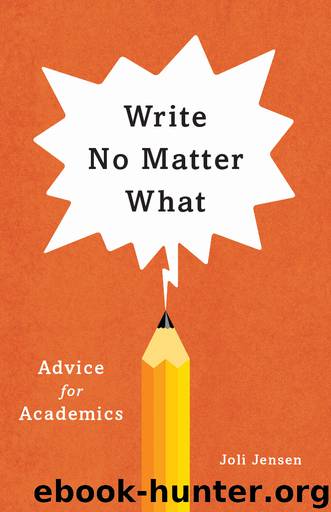Write No Matter What by Joli Jensen

Author:Joli Jensen [Jensen, Joli]
Language: eng
Format: epub
ISBN: 978-0-226-46184-7
Publisher: University of Chicago Press
Published: 2017-04-05T16:00:00+00:00
19 } Finding the Lost Trail
Losing your bearings in your writing project is extremely unsettling. This can happen early on, when the trajectory of your argument seems to shift. It can happen in the middle, when you’ve lost track of the path you thought you were on and can’t see another route to follow. Often it happens toward the end of a project, when you can’t find your way out of what has begun to feel like a maze of aimless words.
Every writing project, no matter how small or structured, involves blazing our own trail through our chosen material. In the humanities we tend to focus on questions and arguments, in the social sciences on arguments and evidence, and in the sciences on research questions and findings. Good scholarly work adds something new to our understanding. Even if others have explored this territory, no one will ever walk the exact trail we are forging.
We get general orientation from our disciplines: the scientific report, the social science article, and the humanistic essay each has its own professional norms that tell us how to introduce, review, present, analyze, and conclude our written work. Professional norms may offer us guidelines for how to organize our words, but they can’t tell us what we have to say or how we can best say it.
Which is why every writer needs what is called a “through-line.” A through-line orients us (and our readers) through our particular set of questions, arguments, or evidence. You can imagine it as a clothesline onto which we hang our introductory claims, literature review, analysis, and conclusions. We use our through-line to focus and arrange what we have to say, which helps us (as well as our readers) make sense of the material we are covering. A through-line gives us direction, and it keeps us from wandering onto other possible paths in our circumscribed forest.
The through-line offers a map we hope to follow—it organizes our outline. But a map is just an abstract plan, not the route itself. As many writers discover, the path we are following can disappear on us, sometimes more than once.
This is okay. Losing our way in a project is a necessary part of writing it. Handled effectively, getting lost offers us a chance to do even better scholarly work. Handled ineffectively, it derails and stalls us. When you find yourself lost—uncertain of where to head next—you need to find ways to reorient and move forward.
A colleague in the humanities got lost toward the end of writing her first book. It was not based on her dissertation—she had made the brave decision to use a new project as her “tenure book.” Her first-choice academic press is eager to see her completed manuscript. There is pressure on her to get it published before her tenure review. She leads one of our writing groups, and she knows and uses the taming techniques. Yet she spent nearly six weeks of her precious summer writing time floundering—by her own definition, lost.
Fortunately she did everything right.
Download
This site does not store any files on its server. We only index and link to content provided by other sites. Please contact the content providers to delete copyright contents if any and email us, we'll remove relevant links or contents immediately.
Asking the Right Questions: A Guide to Critical Thinking by M. Neil Browne & Stuart M. Keeley(5775)
Autoboyography by Christina Lauren(5235)
Eat That Frog! by Brian Tracy(4540)
Dialogue by Robert McKee(4405)
Sticky Fingers by Joe Hagan(4199)
Journeys Out of the Body by Robert Monroe(3624)
Annapurna by Maurice Herzog(3468)
Full Circle by Michael Palin(3450)
Schaum's Quick Guide to Writing Great Short Stories by Margaret Lucke(3381)
Elements of Style 2017 by Richard De A'Morelli(3350)
The Art of Dramatic Writing: Its Basis in the Creative Interpretation of Human Motives by Egri Lajos(3068)
Atlas Obscura by Joshua Foer(2962)
Why I Write by George Orwell(2955)
The Fight by Norman Mailer(2942)
The Diviners by Libba Bray(2938)
In Patagonia by Bruce Chatwin(2932)
The Mental Game of Writing: How to Overcome Obstacles, Stay Creative and Productive, and Free Your Mind for Success by James Scott Bell(2909)
Venice by Jan Morris(2574)
The Elements of Style by William Strunk and E. B. White(2473)
